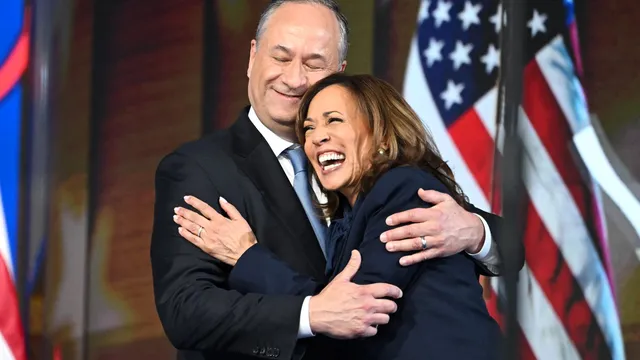
Emhoff's Vision of Masculinity Challenges Trump's Retro Appeal
2024-09-27 15:31- Doug Emhoff is promoting a supportive and progressive view of masculinity to attract male voters.
- This approach contrasts sharply with the retro, macho image associated with the Trump campaign.
- The Harris campaign is actively working to engage male voters, highlighting the evolving definitions of masculinity in politics.
Express your sentiment!
Insights
In a recent discussion on MSNBC, contributor Katty Kay highlighted the contrasting visions of masculinity presented by the Trump and Harris campaigns. Doug Emhoff, husband of Vice President Kamala Harris, aims to connect with male voters by promoting a supportive and progressive view of masculinity, which stands in stark contrast to the retro, macho image associated with Trump. Emhoff expressed the importance of leading by example, emphasizing that supporting a spouse does not diminish one's masculinity. Kay noted that the Harris-Walz campaign is actively trying to engage male voters, particularly as polls indicate strong support from female voters. The conversation underscored the broader cultural implications of masculinity in contemporary politics, suggesting that both traditional and modern views can coexist. Emhoff's approach is seen as a strategic effort to attract a diverse male audience, countering the more aggressive and stereotypical representations of masculinity prevalent in the GOP narrative.
Contexts
In recent years, the discourse surrounding masculinity in American politics has evolved significantly, reflecting broader societal changes. As the nation grapples with issues of gender equality and the role of men in a shifting landscape, voices like that of Minnesota Governor Tim Walz have emerged. Walz, a Democratic vice presidential candidate, emphasizes the interconnectedness of men's and women's struggles, arguing that a world where men are floundering is not conducive to women's flourishing. This perspective challenges the traditional narrative that often pits gender against gender in a zero-sum game. The conversation around masculinity has also been shaped by contrasting views from both sides of the political spectrum. Republican masculinity, as noted by scholars, has become increasingly performative, characterized by bravado and machismo. Figures like Senator Josh Hawley have voiced concerns over what they perceive as a leftist agenda that labels traditional masculinity as toxic. This tension highlights a broader cultural anxiety about the role of men in society, particularly in the wake of women's rights advancements and changing family dynamics. Statistics reveal troubling trends among boys and young men, who are statistically more likely to struggle academically and face mental health challenges. The American Psychological Association notes that boys tend to perform worse in school than girls, leading to lower college attendance rates. This decline raises questions about the societal expectations placed on men and the implications for future generations. As the political landscape continues to evolve, the dialogue around masculinity remains crucial. With leaders like Doug Emhoff, who proudly supports his wife Kamala Harris, and the recognition of 'nice guys' in politics, there is a growing acknowledgment that masculinity can take many forms. The challenge lies in redefining these ideals to foster a more inclusive and equitable society for all.